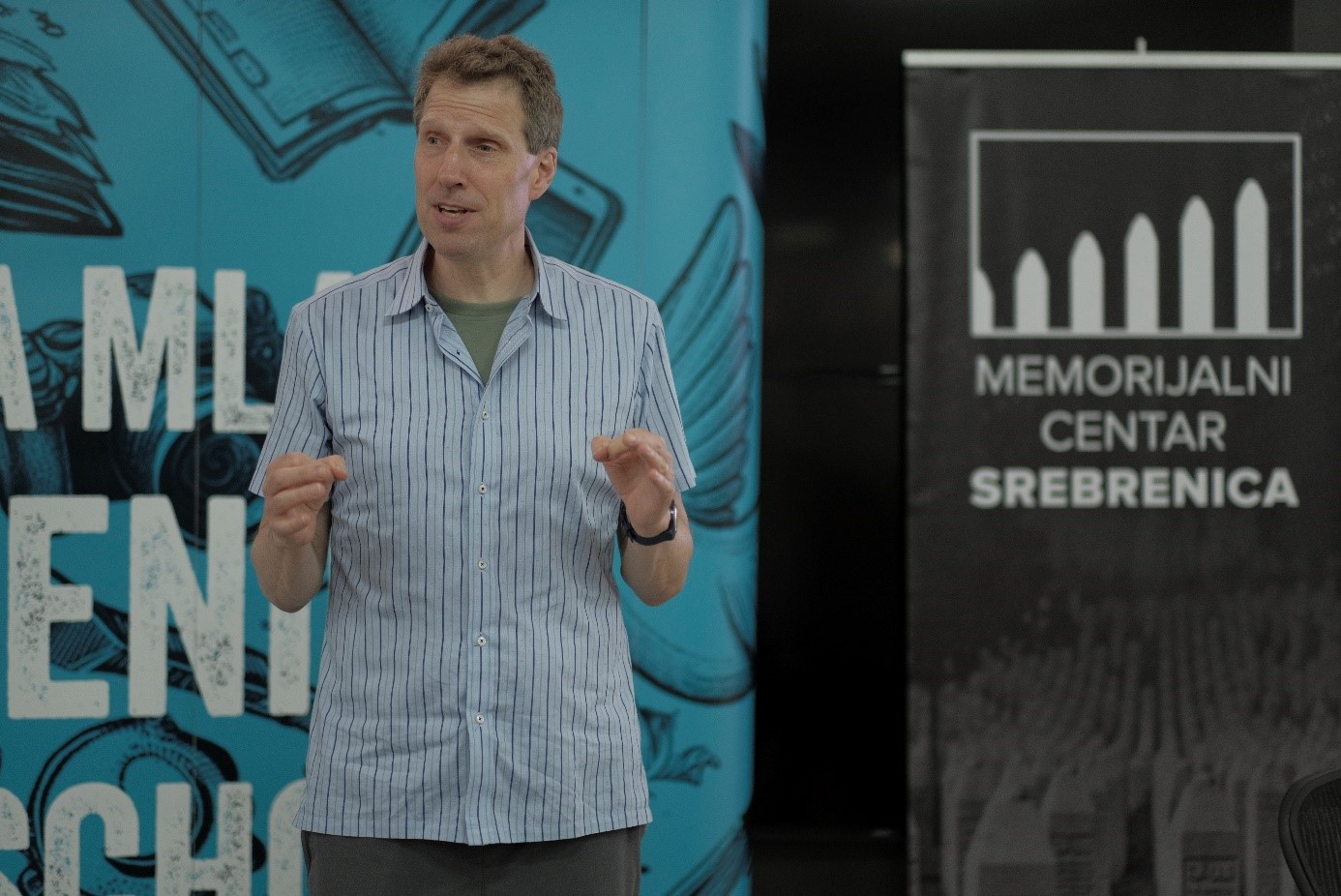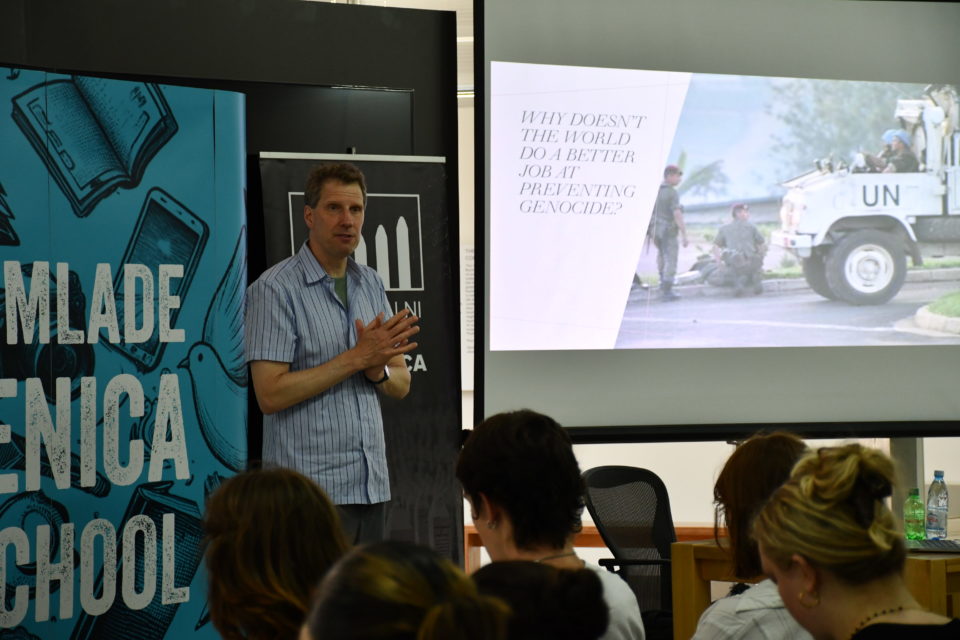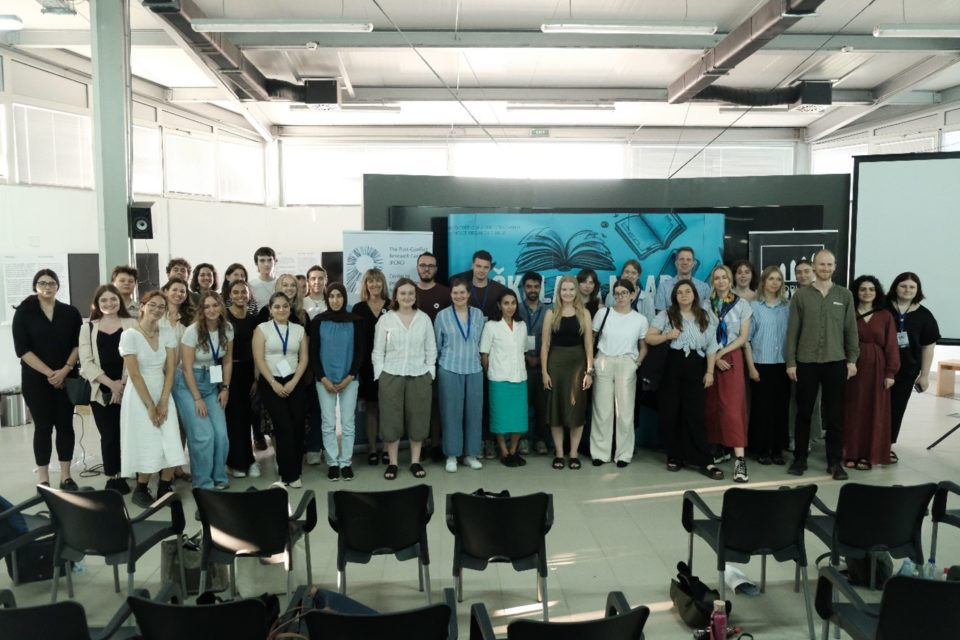
David J. Simon, a Senior Lecturer in Global Affairs and the Director of the Genocide Studies Program at Yale University, emphasizes that substantive discussions about genocide are crucial to prevent mass atrocities.
“When genocide becomes a slogan, something that’s shouted and not something that’s considered, it actually loses some of its power and meaning. So, I think academics should be talking more about what genocide actually is,” said Simon.
Professor Simon hopes that institution building can lead to better responses to genocide in the twenty-first century. Currently, however, he sees little progress since 1994 and 1995.
During the 29th commemoration of the Srebrenica genocide, Professor Simon spoke at the Srebrenica Memorial Center conference “Empowering Through Remembrance: Upholding Generational Responsibility.”
Reflecting on the event, Simon remarked, “There’s simply a global responsibility to bear witness, to listen, and to pay respects to survivors and to victims as one does at a commemoration event. Commemorations are irregular, they are abnormal, they’re not everyday life, but they also expose a lot of the raw feelings, the things that are covered up in everyday life.”
During the 2024 Srebrenica Youth School, organized by the Post-Conflict Research Center and Srebrenica Memorial Center, Simon delivered a lecture entitled “Why Doesn’t the World Do a Better Job at Preventing Genocide?” The lecture title reflects Simon’s deep frustration with the international community’s inadequate response to the crisis in Sudan and its broader failure to prevent genocide globally.

“I recognized it as the same frustration you hear when people talk about the United Nations, the Dutchbat [Dutch battalion stationed in Srebrenica, under the command of the UN peacekeeping forces] cooperating with Mladić and the VRS [Army of Republika Srpska], or in Rwanda, where the UN Security Council voted to reduce the size of the peacekeeping force in the heat of the genocide, rather than augment it,” noted Simon.
Ambitious Leaders: Genocide in Bosnia
When addressing conditions in which mass atrocities may occur, Simon employs a two-pronged analysis. From a top-down perspective, Simon highlights the role of political leaders in orchestrating genocides.
“The top-down version is what political scientists like to focus on. It’s understanding genocides as political projects, and that’s so clear in both Bosnia and in Rwanda. They never would have happened if there hadn’t been a set of aspiring leaders, leaders who were fearing a loss of power and resorted to this extreme ethnic mobilization. Melani Cammett [Director of the Weatherhead Center for International Affairs at Harvard University] refers to ‘ethnic entrepreneurs,’ and that’s exactly the right phrase. It is not that ethnicity or other bases of identity are simply false consciousnesses, because such distinctions are certainly real in any meaningful sense. But the sense of what identity means is stoked by elites. It gets created and recreated by messages that are often delivered or infused from above.”
Meanwhile, the bottom-up approach examines why individuals participate in these atrocities and why people take up arms. He explains that in Rwanda, there was the Interahamwe, a state-supported but irregular militia, which was actually the youth wing of the Hutu party. This was just one of the groups and segments of society that became militarized.
“The question is: why did people join them? Why do people respond to those calls of mobilization?” asks Simon.
This examination of why individuals engage in violence raises broader concerns about the societal conditions that enable such participation, extending into the contemporary context. Simon notes the example of the United States, where connections are growing between political elites and increasingly angry segments of the population. He warns that when anger and political power align, they can create conditions for widespread violence.
“I’m not going to say that the United States is on the cusp of genocide. But one has to think about the kind of broad dynamics in Rwanda, Bosnia and Herzegovina, Serbia, and Croatia; to think about what applies and what doesn’t, what resources of mediation and moderation should we be trying to reinforce in other settings, including the American setting,” Simon explains.
He emphasizes the importance of mediating forces: people or institutions that can counteract harmful narratives:
“When institutions are present to say ‘that’s wrong,’ they help prevent these connections from forming. But when they melt away, or when people from those institutions join one side or the other, it’s an extremely dangerous situation.”
Limitations to Effective Genocide Prevention
Professor Simon is the director of the Yale Genocide Studies Program, a pioneering academic initiative dedicated to genocide studies that was established in 1998. It evolved from the Cambodian Genocide Program, another Yale university project, launched in 1994. This earlier initiative focused on the atrocities in Cambodia between 1975 and 1979 and sought to ascertain accountability for the crimes committed by the Pol Pot regime (GSP, 2024a; GSP, 2024b).
Professor Simon reminisced on the program’s evolution:
“When the grant to document the Cambodian Genocide Study ran out, the founder, Ben Kiernan, my predecessor as the director, appealed to the university and said, look, we’ve generated a lot of interest. It’s not just Cambodia. It’s not just the Holocaust, not just Armenia. There are experts from all three of those at Yale. Let’s talk about what’s happened in Rwanda this decade, the ‘90s. Let’s talk about what happened in Srebrenica and elsewhere in Bosnia this decade. So, it’s early in the 1990s where the field of genocide studies is being born. But it’s being born with experts on Cambodia, experts on Rwanda, experts on Bosnia, who had extensive knowledge on these genocides.”
During his career, Simon also worked as a consultant for several UN offices, including the Office of the Special Advisor for the Prevention of Genocide.
As a specialist in international responses to genocide, Simon critiques the UN system’s structure, which he believes disproportionately empowers the five permanent members of the Security Council with veto authority. This imbalance, he argues, often hinders effective action against genocide:
“Clearly those rules need to change, and I think that there are some ways that it can be done within the UN system. Otherwise, perhaps, there’s some way to build a sort of specific anti-atrocity international regime outside of the UN system that will have legitimacy unto its own. The other options are the international courts and a stronger international rule of law regime.”
The International Court of Justice (ICJ) holds jurisdiction over the interpretation of genocide through the Convention on the Prevention and Punishment of the Crime of Genocide, which has been in effect since 1951. The ICJ applies a stringent legal standard for recognizing acts as genocide, emphasizing that the mere mass killing of people is insufficient for this designation. To constitute genocide, there must be clear evidence of a specific intent to destroy a group entirely or in a particular place (McIntyre, 2024).
As Simon notes, drawing on the example of South Africa’s case against Israel, “So far, the ICJ has basically said, ‘we’re watching you, Israel – pay attention to hate speech, or incitement, pay attention to the humanitarian crisis.’ But it has been reluctant to say anything about a ceasefire, using military force, and other elements that dominated the news in the first six months or so after the post-October 7 campaign in Gaza began. For the judges on the Court, it has been less clear that those are instances of genocide. It may be very clear that they are instances of war crimes and crimes against humanity, but the ICJ has no jurisdiction over those crimes.”
Meanwhile, Simon highlights a promising development: the drafting of a Convention on Crimes Against Humanity. While this initiative hasn’t received widespread attention, Simon sees this as positive “because it can maybe gain some momentum before its opponents are aware of how revolutionary it could be.”
This new convention would run parallel to the existing Genocide Convention and, if adopted, would allow the ICJ to adjudicate cases of crimes against humanity. Simon believes that this could enable earlier intervention and neutral oversight in cases that do not meet the threshold for genocide but still require international attention.
While the International Criminal Court (ICC) has jurisdiction over crimes against humanity, as well as over genocide, war crimes, and the crime of aggression, it differs from the ICJ in that it can only investigate and prosecute individuals, while the ICJ resolves disputes between states. The establishment of a crimes against humanity convention would thus complement the ICC’s work by providing a crucial mechanism for addressing crimes against humanity at the state level.
Clicks Lead to Extremism
The role of media, especially in the digital age, further complicates responding to atrocities. Simon highlights the significant shift over the past 30 years from traditional media to social media: “We went from one single media for everybody to each nation getting their own media, to social media, where in a way, driven by algorithms, every individual gets their own media feed.”
Simon observes that social media has undermined the traditional media’s role of providing a more comprehensive perspective on current events. Instead, it encourages the media to prioritize engagement at any cost.
“The design of the algorithms is to drive clicks and engagement and sales. And the social media companies know that what drives clicks and engagement is essentially extremism,” he explained.
This focus on sensational content has fueled growing polarization, as people have become less interested in broadening or educating their own perspectives and more focused on feeding their resentment for the opposing side.
“People don’t want to, and they don’t get the same information the other side is getting. Because they’re getting different information, both sides would like to cling to a single narrative that reinforces their own views without challenging them,” Simon remarked.
These divisions, according to Simon, undermine the potential of global civil society to unite and build consensus for effective anti-atrocity interventions. Despite the wealth of information and awareness about global atrocities, which is partly due to well-documented crimes, global politics often prevails over the understanding and motivation needed to act against such atrocities. As Simon puts it, “the digital revolution doesn’t necessarily move the politics needle at all.”
Corporate Responsibility for Atrocity Potential
Professor Simon partnered with Nathaniel Raymond, Executive Director of the Humanitarian Research Lab at the Yale School of Public Health, to launch the Mass Atrocities in the Digital Era (MADE) initiative in 2019, as part of the Yale Genocide Studies Program. The initiative grew out of a project that investigated the role of Facebook in promoting ethnic violence in Myanmar. The initiative’s goal was to gather evidence that could be used in a potential court case if Facebook were to be called as a witness.

“One of the key motivating concepts of our Facebook Myanmar project was that there should be some sort of presumption that a company like Facebook [now Meta] has a duty of care to make sure that, when it enters a market, its product won’t be used for ill or especially for mass atrocities. And plausible deniability isn’t enough. There should be some sense of corporate responsibility that’s more attuned to the prospect of atrocities than apparently companies tend to hold themselves to at the moment,” Simon stated.
Simon points out that under the Alien Tort Statute in U.S. law, companies can be held liable for negligence if there is any connection to the U.S., regardless of where the alleged misconduct occurs. Thus, Facebook’s activities in a foreign country like Myanmar are still relevant.
From a legal standpoint, holding social media companies accountable for complicity in mass atrocities is difficult without first addressing these fundamental questions about where such misdeeds occur. He illustrates this by questioning the locus of Facebook’s alleged misdeeds:
“Does it take place in California where decisions are being made about the business model for entering Myanmar? Does it take place in Yangon where the contract between Myanmar and a social media company is being signed? Does it take place in Singapore or Ireland where the server farm exists, where the data is stored?”
Examining the situation in Myanmar revealed a broader area of inquiry that required extensive work. As a result, the Facebook Myanmar project evolved into a more comprehensive MADE initiative.
MADE explores the impact of emerging technologies on mass atrocities, focusing on prevention and countering the digital strategies used by perpetrators. Simon reflected on the evolving nature of this challenge:
“My experience with new digital technologies in the last two decades tells me that everything’s a sort of arms race. One development is countered by a counter development which requires a countermeasure. There’s no endpoint where everyone agrees we have the technology that we want and we’ll keep it that way. There’s a lot of money in holding on to power if you are an extremist nationalist who’s willing to go to the extent of committing atrocities to gain or remain in power. And the anti-atrocity movement is up against this daunting dynamic.”
The initiative also seeks to enhance the possibility to use digital evidence in both criminal and civil proceedings. Simon explains, “Another digital issue is that there’s so much information, so much documentation of, especially war crimes, indiscriminate bombing of civilian areas in Syria, in Ukraine, in Gaza, that it’s actually sort of hard to parse it all out, and to figure out what might be usable in a court of law. One of the other global projects that MADE would like to support is helping to store and preserve all of this digital documentation in a way that promotes its use as evidence in a court eventually, and in a way that promotes its use for scholarly research to help us understand patterns of perpetration and survival, and all the things that people study with respect to genocide studies.”
Memorialization and Encouraging Dialogue
When asked about the risks of the manipulation or selective use of digital data, Simon emphasizes the importance of authentication in data collection and preservation. “I think to this point it’s generally possible to distinguish between AI-generated content and authentic material,” he notes. Nonetheless, he advocates for developing a universally applicable authenticity standard that can be used in legal proceedings.
“Of course, standards can be forged. As soon as that standard is established there will be efforts to forge compliance with it. So, it’ll probably be some sort of cat and mouse game that takes decades.” Simon acknowledges that deepfakes are a significant concern, noting that they have already been used in potential atrocity situations.
In addition to managing and utilizing digital evidence, MADE investigates how digital technologies can be employed for the memorialization of mass atrocities. The initiative also aims to foster dialogue among experts in genocide studies, international criminal law, and internet data governance.
“I feel like I am privileged to work with a community of scholars – not just at Yale, but globally – that is not seeking fame or fortune or glory from engaging in anti-atrocity work, but simply, wants to advance that side of the cause. We can’t just stop where we are now. We need to bring people into the fold on that, have international lawyers and tech geniuses working on these subjects. And it doesn’t necessarily take a lot of people, but it takes the right amount of the right people working together. It’s a battle of brains and I think we can bring the brains on our side, but it’s ongoing. It’s not like there’s a finite point at which we’ll be able to declare victory over the forces of genocide,” Simon concludes.






